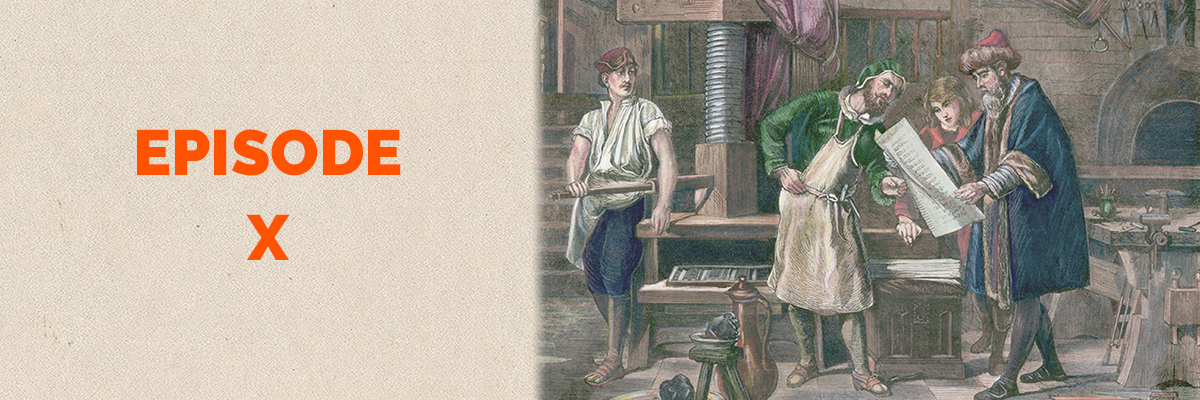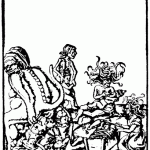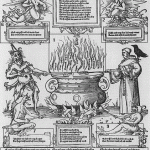The disruptive effects of the internet and social media on the spread of information are unprecedented. Or are they?
In episode 10 of Clear and Present Danger, we cover the invention, spread, and effects of the Gutenberg printing press:
- What significance did this new technology have for the dissemination of knowledge and ideas?
- Why was the printing press instrumental in helping a German monk and scholar break the religious unity of Europe?
- What happened when new religious ideas raged through Europe like wildfire?
- And did Martin Luther’s Reformation lead to religious tolerance and freedom, or persecution and censorship?
You can subscribe and listen to Clear and Present Danger on iTunes, Google Play, YouTube, TuneIn and Stitcher, or download episodes directly from SoundCloud.
Stay up to date with Clear and Present Danger on the show’s Facebook and Twitter pages, or visit the podcast’s website at freespeechhistory.com.
Email us feedback at freespeechhistory@gmail.com.
Religious And Political Memes:
Literature: Episode 10
Gutenberg, the Printing Revolution and the Renaissance
- Atiyeh, G.N. (1995): The Book in the Islamic World : The Written Word and Communication in the Middle East. Albany, NY: State University of New York Press.
- Baron, S.A., Lindquist, E.N. & Shevlin, E.F. (2007): Print Culture Studies after Elizabeth L. Eisenstein. University of Massachusetts Press.
- Broedel, H.P. (2003): The Malleus Maleficarum and the Construction of Witchcraft : Theology and Popular Belief. Manchester University Press.
- Clapham, M. (1957): “Printing” in: Singer, C. (ed.): A History of Technology vol. III: From the Renaissance to the Industrial Revolution c.1500–1750. Oxford University Press. Pp 377–411.
- Cosgel, M.M., Miceli, T.J. & Rubin, J. (2009): “Guns and Books: Legitimacy, Revolt and Technological Change in the Ottoman Empire”. Economics Working Papers. 200912.
- Eisenstein, E.L. (2005): The Printing Revolution in Early Modern Europe. 2nd ed. Cambridge University Press.
- Eisenstein, E.L. (1980): The Printing Press as an Advent of Change Vol. I & II. Cambridge University Press.
- Febvre, L. & Martin, H-K. (1976): The Coming of the Book: The Impact of Printing 1450-1800. (Transl. by Gerard, D.). London, UK: NLB.
- Ferguson, N. (2018): “When Gutenberg Met Luther” in: The Tower and the Square: Networks and Power, From the Freemasons to Facebook. Penguin Press.
- Gatti, H. (2017). Ideas of Liberty in Early Modern Europe : From Machiavelli to Milton. Princeton University Press. Kindle edition.
- Gilmore, M.P. (1962): The World of Humanism, 1453–1517. Harper and Row.
- Grendler, P.F. (1988): “Printing and censorship” in: Schmitt, C.B. (1988) (ed.): The Cambridge History of Renaissance Philosophy. Cambridge, UK: Cambridge University Press.
- Hay, D. (ed.) (1957): The New Cambridge Modern History vol. I: The Renaissance 1493-1520. Cambridge University Press.
- Holborn, L.W. (1942): “Printing and the Growth of a Protestant Movement in Germany from 1517 to 1524” in: Church History 11(2) (Jun., 1942). Pp. 123-137.
- Lewis, B. (2003): What went wrong? The Clash between Islam and Modernity in the Middle East. Harper Perennial.
- Naughton, J. (2012): From Gutenberg to Zuckerberg: What you really need to know about the internet.
- Schmitt, C.B. (1988) (ed.): The Cambridge History of Renaissance Philosophy. Cambridge, UK: Cambridge University Press.
- Uhlendorf, B.A. (1932): ”The Invention of Printing and Its Spread till 1470: With Special Reference to Social and Economic Factors” in: The Library Quarterly 2(3) (Jul., 1932): Pp. 179-231.
Martin Luther and the Reformation
- Collinson, P. (2003): The Reformation. London, UK: Weidenfeld & Nicholson.
- Davies, N. (1997): “VII: Renatio: Renaissances and Reformations, 1450–1670”. In: Europe : A history. Pimlico.
- Dickens, A.G. (1966): Reformation and Society in Sixteenth-Century Europe.
- Dittmar, J. & Seabold, J. (2015): “Media, Markets, and Radical Ideas: Evidence from the Protestant Reformation” in: CEP Discussion Papers dp1367, Centre for Economic Performance, LSE.
- Elton, G.R. (ed.) (1990): The New Cambridge Modern History Vol. II, 2nd: The Reformation 1520–1559. Cambridge University Press
- Ferguson, N. (2018): “When Gutenberg Met Luther” in: The Tower and the Square: Networks and Power, From the Freemasons to Facebook. Penguin Press.
- Hahn, S. & Wiker, B. (2012): Politicizing the Bible. The Roots of Historical Criticism. Herder & Herder Books.
- Hillerbrand, H.J. (1973): The World of the Reformation. UK: Biddles ltd.
- Holborn, L.W. (1942): “Printing and the Growth of a Protestant Movement in Germany from 1517 to 1524”. In: Church History 11(2) (Jun., 1942). pp. 123-137.
- Luther, M. (1956): “Psalm no. 82”. In Pelikan, J.J. (ed.): Luthers Works: The American Edition, vol. 13: Selected Psalms II. Concordia and Fortress Press.
- Maggio, E.J. (2006): “An Infamous Legal Treatise: An Examination of the Malleus Maleficarum and Its Effect on the Prosecution of Witches in Europe”. In: Digest (National Italian American Bar Association) 14. Pp. 1–97.
- Marshal, P. (2009): The Reformation – A Very Short Introduction. Oxford University Press.
- MacCulloch, D. (2004): Reformation: Europe’s House Divided.
- MacCuloch, D. (2009): Christianity : The First Three Thousand Years.
- Pettegree, A. (2015): Brand Luther. Penguin Books.
- Riga, P.J. (1978): “Marsiglio of Padova: Father and Creator of the Modern Legal System”. In: Hastings Law Journal 29(6). Pp. 1421–45.
Caricatures and Religious Satire
- Brink, D.M. (2011): “Mellem karneval og kampagne: Den religionskritiske billedsatires historie i Europa”. In: Kritik 44, issue 200. Pp. 160-179. (Danish).
- Brink, D.M., Magnussen, A., Cortsen, R.P. & Lacour, E. (2015): “Fearing religious satire: Religious censorship and satirical counter-attacks”. In: Comics and Power: Representing and Questioning Culture, Subjects and Communities. Cambridge University Press. Pp. 198-223.
- Scribner, R.W. (1981): For the sake of simple folk – Popular propaganda for the German Reformation. Cambridge, UK: Cambridge University Press.
Online literature and articles
- Balow, J.P. (1996): “A Decleration of the Independence of Cyberspace”. Accessible at https://www.eff.org/cyberspace-independence.
- The Economist (2011): “How Luther went viral”, The Economist, 17 Dec. 2011. Accessible at https://www.economist.com/node/21541719.
- Grosman, L. (2006): “You – Yes, You – are TIME’s Person of the Year”, TIME Magazine, 25 Dec. 2006. Accessible at: http://content.time.com/time/magazine/article/0,9171,1570810,00.html.
- Knox, Dilwyn (2018): “Giordano Bruno”, The Stanford Encyclopedia of Philosophy (Summer 2018 Edition),. Zalta, E.N. (ed.). Accessible at: https://plato.stanford.edu/archives/sum2018/entries/bruno/.
- Leonhardt, D. (2018): “Mark Zuckerberg, Enlightened Despot”, The New York Times, 3 Apr. 2018. Accessible at https://www.nytimes.com/2018/04/03/opinion/mark-zuckerberg-facebook.html.
- de (2017): “Interview with Dr. Kai Lehmann, curator of the exhibition “Luther und die Hexen””. Accessible at: https://www.luther2017.de/en/wiki/martin-luther-and-the-witches/kai-lehmann-martin-luther-firmly-believed-in-witches/.
- Machiavelli, N.: Discourses on Livy (transl. by Thomson, N.H.), Chapter 58. Accessible at: http://www.online-literature.com/machiavelli/titus-livius/58/.
- Nederman, C. (2014): “Niccolò Machiavelli”, The Stanford Encyclopedia of Philosophy (Winter 2014 Edition), Zalta, E.N. (ed.). Accessible at: https://plato.stanford.edu/entries/machiavelli/#7.
- Shane, S. (2017): “The Fake Americans Russia Created to Influence the Election”, The New York Times, 7 Sept. 2017. Accessible at https://www.nytimes.com/2017/09/07/us/politics/russia-facebook-twitter-election.html.
Great podcasts covering the subjects of this episode
- Dan Carlin’s Hardcore History episode 48: “Prophets of Doom”. Accessible at: https://www.dancarlin.com/product/hardcore-history-48-prophets-of-doom/.



